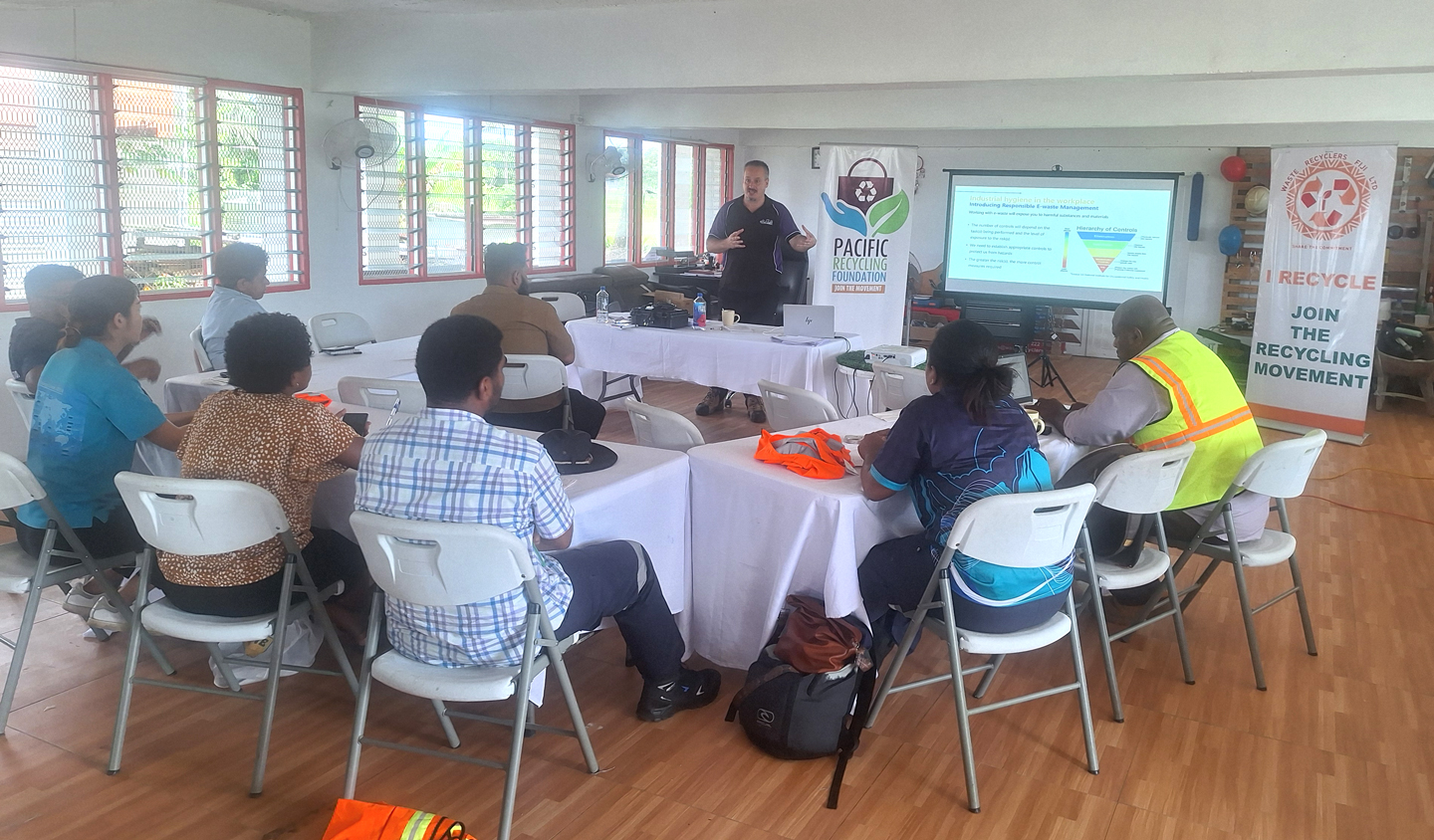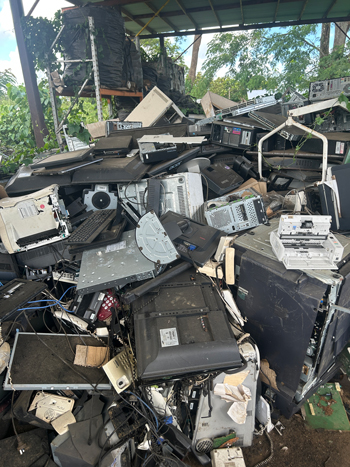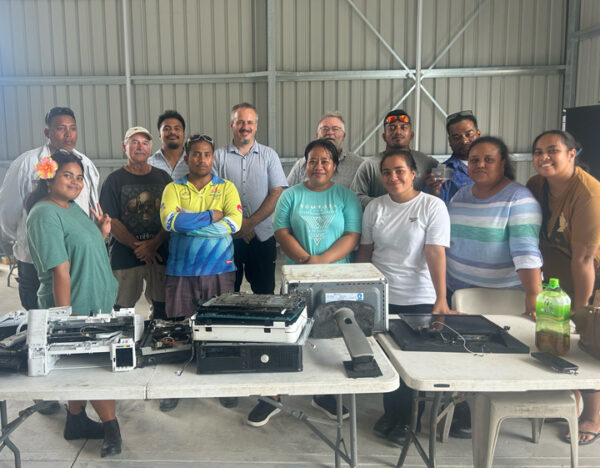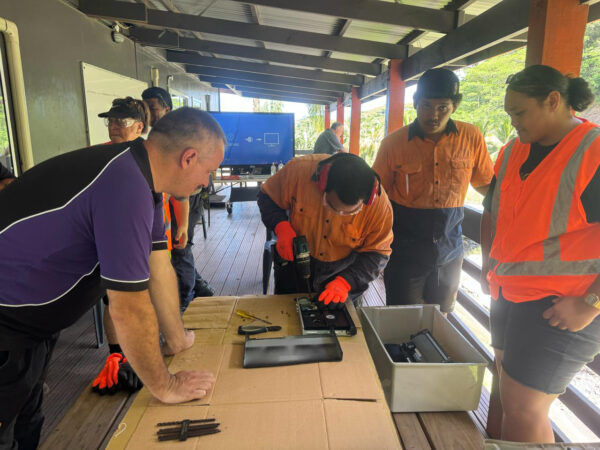
In early 2024 TechCollect NZ was awarded a contract to deliver an e-waste management training program for the Pacific Islands, as a part of the Secretariat of the Pacific Regional Environment Programme (SPREP) PacWaste Plus program. The program aims to establish cost effective and sustainable management practices that reduce waste and pollution as well as address broader impacts including human health and wellbeing, climate change, disaster management, biodiversity conservation and resource recovery. TechCollect NZ was engaged to lead and undertake a project that would:
- Identify and provide the essential tools and equipment to establish e-waste management operations
- Develop competency-based training modules and materials to establish best practice e-waste management procedures adapted to localised settings
- Manage legacy e-waste and whiteware stockpiles
- Deliver hands-on training to support stockpile management activities and ongoing e-waste operations
TechCollect NZ, in mobilising the project, engaged both Australia and New Zealand Recycling Platform (ANZRP) and The Recycling Group (NZ) to lend support to the training content development and the on-island execution of the program.
In February 2025, the program was first run on the tiny island nation of Niue. Niue, a small Pacific Island nation, faced challenges in handling e-waste and ensuring it is treated safely and ultimately recycled. These challenges were mainly due to its size, remote location and lack of infrastructure, and were common to other nations in the region.

Expanding influence, building knowledge and raising standards
Such was the success of the program in March, the initiative was expanded, by way of a further contract, to support additional capacity building across the region, covering the neighboring nations of Kiribati, Samoa, Fiji and the Cook Islands. This decision was clear recognition that the assistance provided by TechCollect NZ and its partners ‘hit the spot’ in that the focus and outcomes centered on knowledge transfer, rather than building dependence on external expertise. Andrew But, ANZRP’s Operations & Compliance Manager, was again invited to support the work, and was pleased to lend his expertise and enthusiasm to the task at hand.
As with the Niue program, this initiative involved providing training, skills and advice on how to:
- Improve safety outcomes
- Streamline handling and management processes to optimise environmental and economic outcomes
- Ensure the island nations had robust strategies to manage legacy e-waste (where this was present) and load into containers for safe shipment to approved offshore recyclers
- Enable the local workforce to fully manage the process going forward, reducing reliance on external support.
The training included both “in classroom” sessions and hands on practical instruction on the ground, which served to ensure that all aspects were engaging and beneficial.
How is waste managed at present – including e-waste
Kiribati, Samoa, Fiji and the Cook Islands, like Niue, historically lacked the infrastructure and expert know-how to manage the e-waste. Numerous transfer stations visited did not have suitable e-waste collection equipment or infrastructure, protective cover from the elements, or were overgrown with vegetation and in some cases, landfills were open to the public for ‘scavenging’. (In fact, some sites actively supported and enabled the community of “pickers” by allowing them to take things of value from the dump-face, before the waste was bulldozed into the mound). Overall practices and procedures around the management and storage of e-waste also varied considerably from location to location, even within the nations visited. Whilst Rarotonga, in the Cook Islands, was fairly well set up, there were many challenges on the outer islands.
Fiji and Samoa, by contrast, had more established services, including in some urban areas where e-waste was collected several times per year through a designated hard waste service, and then transported to a central location for further pre-processing. This encompassed stripping certain products of circuit boards and the degassing of fridges.
Andrew also noted that whilst there was an awareness and concern for safety there was not always personal protective equipment (PPE) readily available to all workers in each location visited.
All in all, there was considerable scope for improving practices but importantly there was a strong commitment and eagerness to do so.


What we achieved
Over the course of the program, Tech Collect NZ, along with ANZRP, provided training to a total of 59 individuals from five countries and enjoyed a high level of engagement. These individuals represented organisations from government, local authorities, and the waste and recycling industries.
To measure the impact of the program all trainees were required to complete an assessment questionnaire at the commencement of the program. The questionnaire was completed again at the end of the initiative and revealed that participants effectively doubled their knowledge. This improvement has left them and their communities in a much better position to manage e-waste more sustainably in the future.
A further benefit was realised in Fiji where representatives from Fiji Waste Recyclers, a local waste and recycling business, attended the training. Fiji Waste Recyclers had years earlier established the Pacific Recycling Foundation, and organisation dedicated to promoting recycling initiatives. Through the training staff discovered that they could optimise their economic returns by extracting the maximum commodity value from the incoming waste and sorting it effectively. This, in turn, could help further fund the activities of the Foundation.
In the Cook Islands, there were similar revelations with attendees gaining an understanding of the value of commodities, and how, through effective pre-processing, they could liberate these commodities to derive enhanced economic benefits from the waste. These small actions all play a valuable part in building the local domestic circular economy.